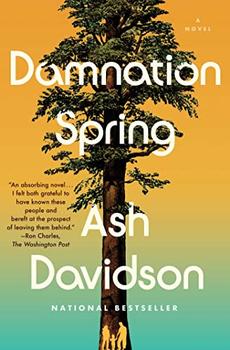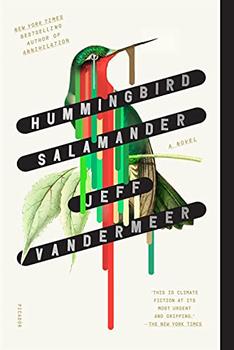Summary | Excerpt | Reading Guide | Reviews | Beyond the book | Read-Alikes | Genres & Themes | Author Bio

Barkskins by Annie Proulx is not a book to read quickly. After a month of slow reading, I appreciate having had the time to reflect on its thematic narrative, as well as its complex characters and, through the ways they live, the messages they present.
The story begins in the Canadian enclave of New France (see Beyond the Book) and traverses the indigenous forests of Québec and New Brunswick (Canada), Maine, and the Coromandel (New Zealand); and also the cities of Boston, Amsterdam (Holland), La Rochelle (France), Guangzhou (China), and Port Jackson (Australia) – international forest and trade route destinations Proulx clearly enjoyed researching.
On the surface, Barkskins is a historical novel spanning 320 years from 1693 to 2013; a family saga of the descendants of two Frenchmen, Charles Duquet and René Sel, who are indentured to landowner Monsieur Trépagny in New France, a tract of territory colonized by France from 1534 to 1763 that is now part of Canada, the US, and two islands that are still overseas territories of France off of the Canadian coast.
Throughout the story, Proulx explores the ways indigenous populations live more in harmony with nature than colonizers; they instinctively protect and nurture resources, are deeply connected to places they have inhabited for generations, and possess knowledge that can only be sustained by allowing those traditions to continue unfettered. Conversely, those settling from elsewhere, often proclaiming a high moral and intellectual ground, are motivated by greed, the need to exploit resources, gain power, dominate and suppress anything threatening those ambitions.
The arrival of outsiders shifts this familiar harmony for the indigenous population, and they struggle to retain their traditions and are eventually forced to (or end up realizing that they must) adapt, often taking on characteristics of the colonizers to survive. Those born of mixed blood – indigenous and outsider – are the first to realize this conundrum, for they possess a little of each tendency and struggle with their mixed identity.
Proulx achieves this duality through the twin strands of families descended from the Frenchmen. René Sel marries a Mi'kmaq Indian, (Mi'kmaq territory was the first area of North America to be heavily exploited for European resource extraction), and his descendants self-identify as Mi'kmaq. Charles Duquet, on the other hand, changes his name to Duke and marries the daughter of a Dutch shipping merchant, the first of many strategic unions in his desire to create, expand and retain family interests. Though the two men have similar beginnings, their destinies follow opposite paths and illustrate the often-unbridgeable divide between people with different life philosophies and roots.
Proulx creates lives intrinsically intertwined with the forest, a resource open to exploitation by Christian populations who'd long banished their earlier pagan inclinations that revered the natural world, an idea we are introduced to in the book's opening epigram:
To Mari it was a living entity, as vital as the waterways, filled with the gifts of medicine, food, shelter, tool material, which everyone discovered and remembered. One lived with it in harmony and gratitude.
But that thought René was woman's talk. The forest was there, enormous and limitless. The task of men was to subdue its exuberance, to tame the land.
Proulx avoids cliches and heroes; rather, she creates characters that lead readers to consider the effects of colonization, and the exploitation of natural resources. She focuses on the theme of deforestation, specifically delving into the way it can divide people – the more the outsiders exploit and change the environment, the more indigenous people's ways are judged as lazy and unintelligent. Barkskins provides a well-researched glimpse into some of the world's ancient forests and tree species, a quiet lament for the giants of old that have all but been wiped out, conditions no longer able to recreate the environment in which they once thrived.
A sweeping historical family saga, one of the novel's weaknesses is the vast number of characters and lack of emotional depth. In covering such a wide period, it loses the ability to draw the reader into investing in many of the characters' lives. While it's easy to lose the thread of who's who in the generational sprawl, the family tree is helpful in the print copy, (although sadly indecipherable in the e-book.)
That said, two characters stand out as potential subjects of a novel in their own right, easily capable of achieving that element that compels a reader to read ravenously. Charles Duquet runs away from his master and almost perishes in the aftermath, and his subsequent survival and rise in status is enthralling; and then, generations later, Lavinia Duke's rejection of marriage and, instead, her embrace of the family business at a time when women weren't taken seriously is equally compelling.
Barkskins is a sprawling, epic tour of the recent history of man in relation to the forests of the new world and the clash between indigenous populations of those territories and incoming prospectors – a situation that continues today. It is a thought-provoking work of dedication, written in assured, confident prose that's worth persevering through, particularly for readers who enjoy learning about history and the natural world through character and storytelling.
![]() This review was originally published in The BookBrowse Review in July 2016, and has been updated for the
April 2017 edition.
Click here to go to this issue.
This review was originally published in The BookBrowse Review in July 2016, and has been updated for the
April 2017 edition.
Click here to go to this issue.

If you liked Barkskins, try these:

by Ash Davidson
Published 2022
An epic, immersive debut, Damnation Spring is the deeply human story of a Pacific Northwest logging town wrenched in two by a mystery that threatens to derail its way of life.

by Jeff VanderMeer
Published 2022
From the author of Annihilation, a brilliant speculative thriller of dark conspiracy, endangered species, and the possible end of all things.
Your guide toexceptional books
BookBrowse seeks out and recommends the best in contemporary fiction and nonfiction—books that not only engage and entertain but also deepen our understanding of ourselves and the world around us.